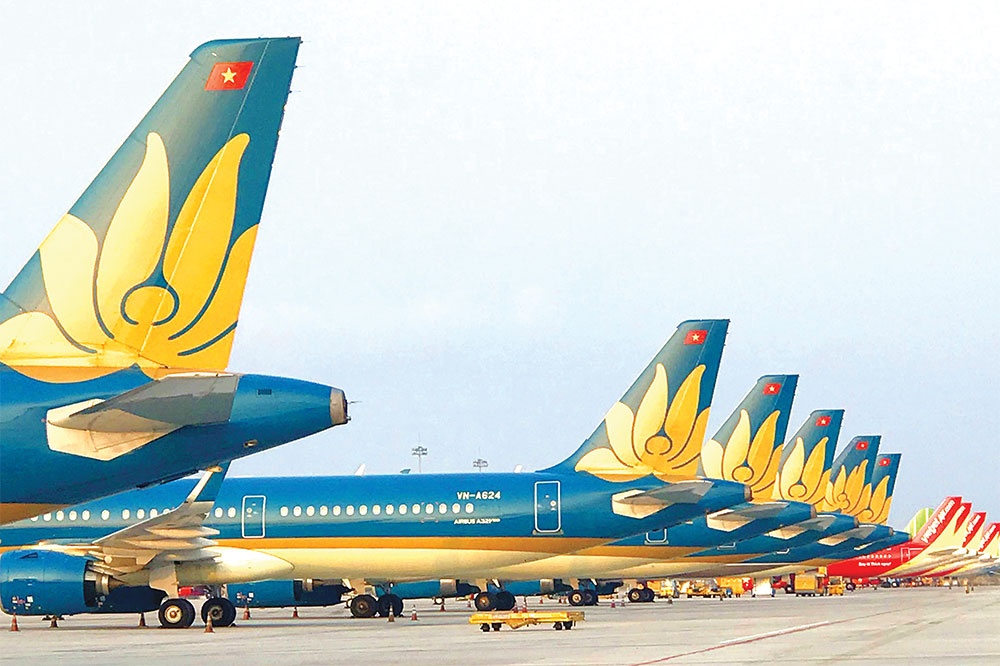Local workers suffer from salary imbalance
Dang Ngoc Hoa, chairman of the Board of Directors of Vietnam Airlines, in late May submitted a proposal to the Ministry of Labour, Invalids and Social Affairs regarding draft resolution and supplemental decree.
An earlier draft from 2020 stipulated that when determining the wage rate, Vietnam Airlines must compensate for the salary gap between Vietnamese and foreign pilots, Hoa said.
 |
| Local workers suffer from salary imbalance (illustration photo/ Photo Le Toan) |
However, due to the impact of the pandemic, Vietnam Airlines did not meet the profit conditions to compensate for the salary difference between Vietnamese and foreign pilots. There has been a significant wage disparity between the two groups of pilots at Vietnam Airlines, even though they hold the same position, fly in the same team, and perform the same duties.
The average salary of a Vietnamese pilot is about $3,600 per month, whereas foreign pilots get approximately $6,200 per month.
“This has led to a total of 154 Vietnamese pilots terminating their employment contracts with Vietnam Airlines since 2018,” Hoa said.
If Vietnam Airlines does not undertake proactive measures to retain its workforce, this figure is likely to rise as the aviation market recovers post-pandemic.
“The resignations and transitions of pilots, particularly during the pandemic recovery phase, poses a grave threat to the airline’s fleet expansion plans. This concern is primarily because the Vietnamese pilots who have requested contract terminations are experienced instructors and captains,” Hoa said.
According to a report by the company, in 2022, over 4,400 employees received wages from the company’s wage fund based on fixed rates, along with 152 foreign pilots who have contracts with labour supply partners, meaning Vietnam Airlines does not directly pay their salaries.
The foreign pilots are hired through the services of another manpower supply company, and the labour costs for a foreign pilot include wages, service fees, insurance, and training, though the actual average salary of foreign pilots is not specified.
Deputy minister of Home Affairs Nguyen Duy Thang indicated that since 2020, Vietnam Airlines has made efforts to approximate the salary payments for Vietnamese pilots to a maximum of 90 per cent of the payments made to foreign pilots.
To establish a basis for determining the additional salary payment for Vietnamese pilots, the Ministry of Home Affairs proposes an amendment to the draft proposal to the government to clarify the actual average salary of foreign pilots at Vietnam Airlines and in the current labour market.
“Based on this, we propose adjusting the ratio of salary payments for Vietnamese pilots compared to foreign pilots to make it appropriate,” Thang said.
This income discrepancy is not exclusive to the aviation industry. Rather, it permeates across all sectors that demand advanced skill sets.
“Income disparity between domestic and foreign workers does exist in some sectors in Vietnam’s labour market, especially among jobs that require high-level relationship management and a high level of expertise,” said human resources consultancy Anphabe.
“Factors impacting this can come from both stereotype perception and practical reasons, such as cost of relocation and benefits for expats to match with their native countries’ living standards, along with other reasons.”
Nguyen Thi Quynh Phuong, director of Human Resources Consulting at Talentnet, credited the income disparity regarding base salary and benefits to the remuneration gap between Vietnam local and foreign-led companies.
“Statistically, in terms of annual base salary, multinational corporations always pay higher than local companies, from 18 per cent in para-professional areas to 36 per cent in management. As for annual total cash, multinationals still pay higher, but the gap is smaller as Vietnamese companies tend to have various bonus and incentives schemes that add up in their annual total income,” Phuong said.
“The differences come from the low salary base of local companies, as Vietnam has a medium living standard in the region, while multinationals usually follow pay policies from their regional offices and headquarters.”
Sectors and industries that require a highly skilled workforce with high risks and responsibilities, such as high-tech, oil, mining, and banking, are those where the disparities are most pronounced.
While the positive prospect of Vietnam’s economy and vibrant cultural lifestyle means the country is in demand for foreigners to relocate, Phuong emphasised that the current trend of optimising local resources at senior levels had helped to reduce the gap.
“Positions for foreigners in multinationals operating in Vietnam account for a small proportion compared to the local employees. Meanwhile, the transparency trend in talent attraction strategy at multinationals is taken into account, so this disparity is not significant,” Phuong said.
“Some practices to increase equity and fairness include a clear performance matrix, data-driven remuneration strategy for benchmarking, as well as periodic open discussions to review work performance and salaries.
 | Vietnam Salary Guide 2023 introduced The Vietnam Salary Guide 2023 was officially introduced on December 12, providing practical insights and data on key industries, allowing organisations and individuals to make better preparations for next year. |
 | Base salary for civil servants, public employees rises to 1.8 million VND from July 1 The Government has issued a decree regulating the base salary for civil servants, public employees, and members of the armed forces, stipulating that it will increase from 1.49 million VND (63.5 USD) to 1.8 million VND per month from July 1, 2023. |
 | Salary gaps must be addressed through upskilling Addressing income disparities between domestic and foreign workers in Vietnam requires collaboration and learning from international cases. Christopher Lee, director of Management Consulting and Workforce Transformation at PwC Vietnam, told VIR’s Linh Le about the focus on developing capabilities and upskilling the local workforce. |
What the stars mean:
★ Poor ★ ★ Promising ★★★ Good ★★★★ Very good ★★★★★ Exceptional
Related Contents
Latest News
More News
- State corporations poised to drive 2026 growth (February 03, 2026 | 13:58)
- Why high-tech talent will define Vietnam’s growth (February 02, 2026 | 10:47)
- FMCG resilience amid varying storms (February 02, 2026 | 10:00)
- Customs reforms strengthen business confidence, support trade growth (February 01, 2026 | 08:20)
- Vietnam and US to launch sixth trade negotiation round (January 30, 2026 | 15:19)
- Digital publishing emerges as key growth driver in Vietnam (January 30, 2026 | 10:59)
- EVN signs key contract for Tri An hydropower expansion (January 30, 2026 | 10:57)
- Vietnam to lead trade growth in ASEAN (January 29, 2026 | 15:08)
- Carlsberg Vietnam delivers Lunar New Year support in central region (January 28, 2026 | 17:19)
- TikTok penalised $35,000 in Vietnam for consumer protection violations (January 28, 2026 | 17:15)

 Tag:
Tag:


















 Mobile Version
Mobile Version